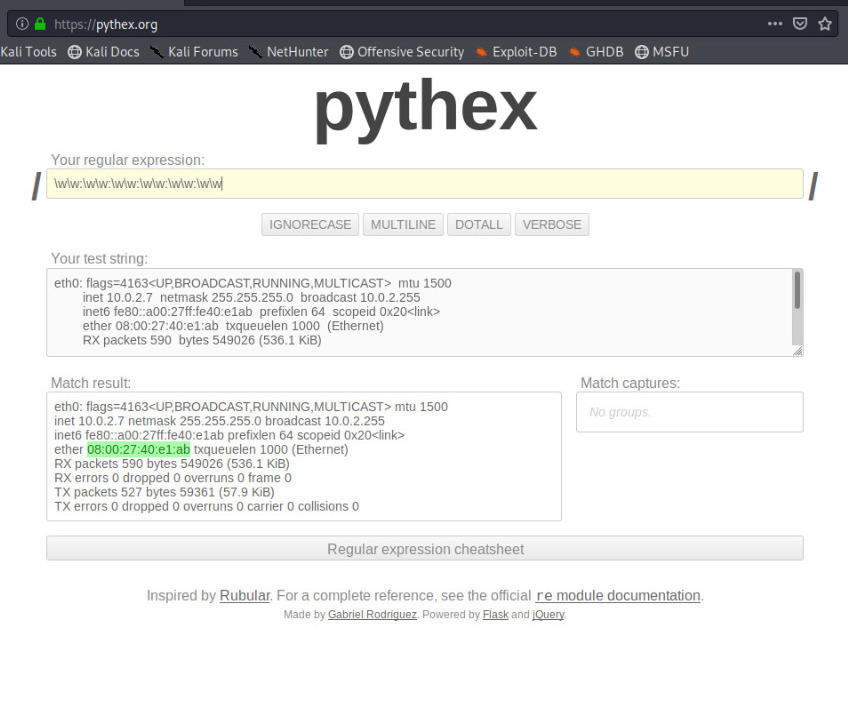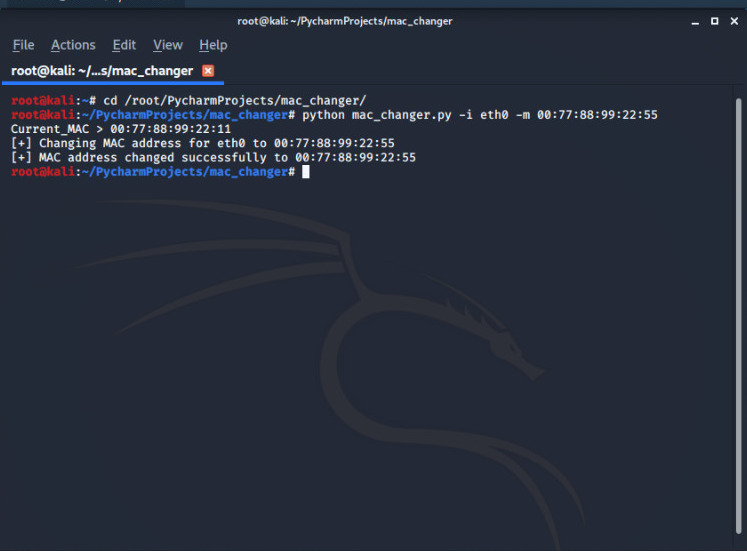MAC CHANGER USING PYTHON
Let’s first discuss on MAC Address in brief , so MAC stands for Media Access Control which is :
- Unique
- Permanent
- Physical and Assigned By Manufacturer
######So why we need to change our MAC Adress ?
The answer is very simple :
- Increase Anonmity
- Impersonate other device
- ByPass Filters
You can know your machine MAC Address in many ways but simplest way is just type:
root@kali:~# ifconfig

ether represents the MAC Address and eth0 has MAC Address of your system.
So here comes the main motive how to change it ?
It’s very simple and let’s see how it’s manually done
root@kali:~# ifconfig eth0 down
root@kali:~# ifconfig eth0 hw ether 00:11:22:33:44:55
root@kali:~# ifconfig eth0 up
AND NOW THE NEW MAC ADDRESS FOR eth0 is

It’s just very simple process three line commands and your MAC Address can be changes just remember to enter a valid Mac Address 12 digits alphanumeric character each two digits seprated by : and you can also chnage the Mac address for your wlan0 interface if you are using a wifi adapter.
So Let’s Begin with How to make our own MAC Changer Tool using Python
You need a basic knowledge of python and some determination to learn something new
So what we actually need is to run our system commands to read and manipulate the value of ether in the code and want to take inputs for interface and new MAC Address in the terminal.
Our problems have very simple solutions we just need to import some Python modules to do it for us.
The first one is subprocess which helps to execute system commands
(Basic Syntax for subprocess)
Syntax (for subprocess):
import subprocess
subprocess.call("COMMAND", shell=TRUE)
you can see official documentation to learn more on subprocess, and to take inputs in terminal optparse is going to help us for this you can also see the official documentation.
Use your desired “Text-editor” I use Pycharm if you want to use this you can download the community version from here.
Create a file “mac_changer.py” and go with the flow
#!/usr/bin/env python
import subprocess
import optparse
def get_arguments():
parser = optparse.OptionParser()
parser.add_option("-i", "--interface", dest="interface", help="Interface to change MAC Address")
parser.add_option("-m", "--mac", dest="new_mac", help="New MAC Address")
(options, arguments) = parser.parse_args()
if not options.interface:
parser.error("[-] Please specify a interface use --help for more info")
elif not options.new_mac:
parser.error("[-] Please specify a MAC address use --help for more info")
return options
So above code is quite simple we defined a function to arguments from user and using optparse we are adding options (-i for interface and -m for new MAC) and using conditional statements for error handling.
Let’s add some more code to make perform some main action.
#!/usr/bin/env python
import subprocess
import optparse
def get_arguments():
parser = optparse.OptionParser()
parser.add_option("-i", "--interface", dest="interface", help="Interface to change MAC Address")
parser.add_option("-m", "--mac", dest="new_mac", help="New MAC Address")
(options, arguments) = parser.parse_args()
if not options.interface:
parser.error("[-] Please specify a interface use --help for more info")
elif not options.new_mac:
parser.error("[-] Please specify a MAC address use --help for more info")
return options
def mac_changer(interface, new_mac):
print("[+] Changing MAC address for " + interface + " to " + new_mac)
subprocess.call(["ifconfig", interface, "down"])
subprocess.call(["ifconfig", interface, "hw", "ether", new_mac])
subprocess.call(["ifconfig", interface, "up"])
options = get_arguments()
mac_changer(options.interface, options.new_mac)
Again we defined a function to change MAC Address using functions in your increase code re-usability and debugging little easier the above code is nothing but system commands to change MAC added in optparse syntax in last two lines we are calling function for getting arguments and changing MAC.
So it’s done you can give shot to check your tool.

Our code is just fine running smoothly . But what if the user not enters a valid MAC Address? We need to set a validation rule for our MAC to make our tool more perfect and we also need to confirm that aur MAC Address is changing.
To get over this we are going to use one new module Regex to match the regular expressions of MAC Address if you look any normal MAC Address its a 12 digit alphanumeric and seperated by colon you can use a very helpful website to create general expressions for MAC Address it’s Pythex.Where you will found \w is used for matching alphanumeric.
So if try to match it you would get a expressions like this

Now we get our desired expressions lets write some code.
def get_current_mac(interface):
ifconfig_result = subprocess.check_output(["ifconfig", options.interface])
mac_address_search_result = re.search(r"\w\w:\w\w:\w\w:\w\w:\w\w:\w\w", ifconfig_result)
if mac_address_search_result:
return mac_address_search_result.group(0)
else:
print("[-] Could not read a MAC Address")
Code is simple and sweet get_current_mac function helps to get the Current MAC and we compare that with our new MAC to confirm our actions that MAC Address changed successfully or not and if you don’t get the this ‘group(0)’
return mac_address_search_result.group(0)
(group(0) is just to get the first expression if there is any similar kinds of expressions in that whole expressions)
Use some conditional statements to refactor the entire code
#!/usr/bin/env python
import subprocess
import optparse
import re
def get_arguments():
parser = optparse.OptionParser()
parser.add_option("-i", "--interface", dest="interface", help="Interface to change MAC Address")
parser.add_option("-m", "--mac", dest="new_mac", help="New MAC Address")
(options, arguments) = parser.parse_args()
if not options.interface:
parser.error("[-] Please specify a interface use --help for more info")
elif not options.new_mac:
parser.error("[-] Please specify a MAC address use --help for more info")
return options
def mac_changer(interface, new_mac):
print("[+] Changing MAC address for " + interface + " to " + new_mac)
subprocess.call(["ifconfig", interface, "down"])
subprocess.call(["ifconfig", interface, "hw", "ether", new_mac])
subprocess.call(["ifconfig", interface, "up"])
def get_current_mac(interface):
ifconfig_result = subprocess.check_output(["ifconfig", options.interface])
mac_address_search_result = re.search(r"\w\w:\w\w:\w\w:\w\w:\w\w:\w\w", ifconfig_result)
if mac_address_search_result:
return mac_address_search_result.group(0)
else:
print("[-] Could not read a MAC Address")
options = get_arguments()
current_mac = get_current_mac(options.interface)
print("Current_MAC > " + str(current_mac))
mac_changer(options.interface, options.new_mac)
current_mac = get_current_mac(options.interface)
if current_mac == options.new_mac:
print("[+] MAC address changed successfully to " + current_mac)
else:
print("[-] MAC not chnaged")
Give a shot to your perfect Tool

This is beginning with the python tools you can make many tools with python be updated with us. You can get the all the neccessary codes from author Github repository.
I hope you enjoyed this writeup and learnt something new if you have any queries feel free to ask in comments box or contact us through mail, or have suggestions for improvements ? We’d love to hear you, send us an email!